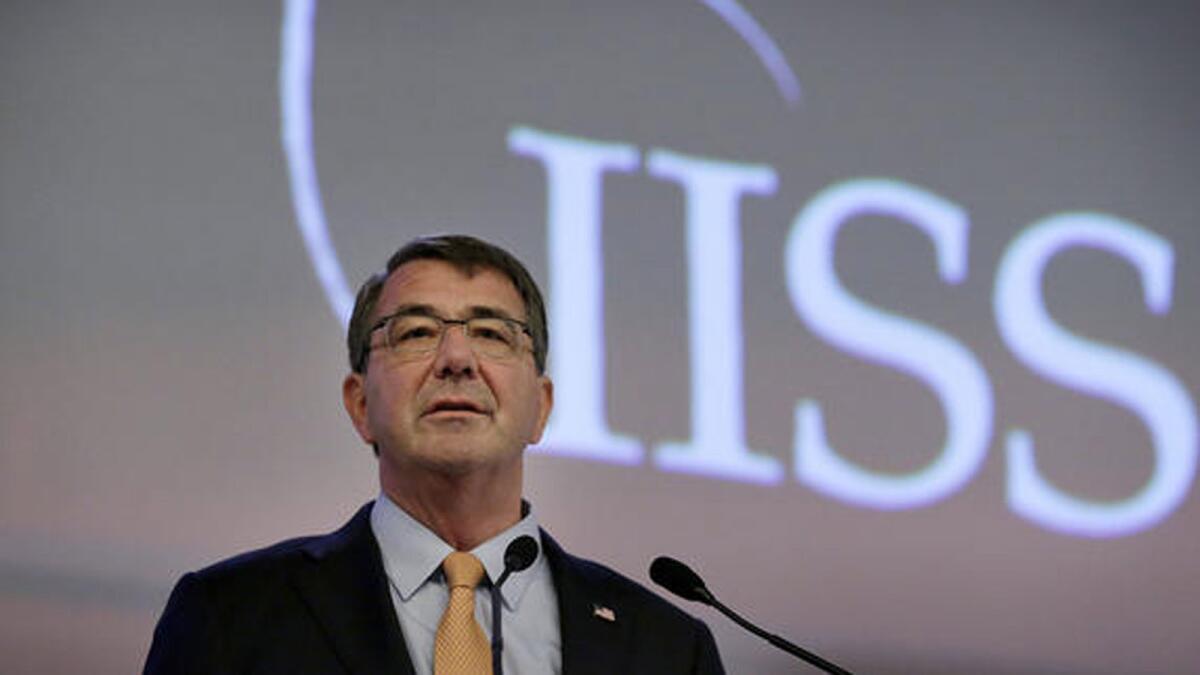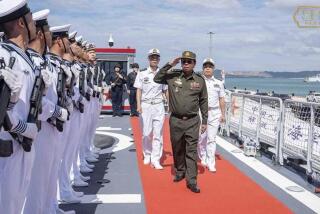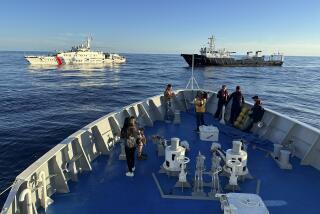Defense Secretary Ashton Carter warns Beijing on South China Sea island-building

Defense Secretary Ashton Carter speaks at the International Institute for Strategic Studies in Singapore on May 30.
Defense Secretary Ashton Carter called Saturday for China to halt its rapid island-building in the South China Sea, warning that the reclamation projects on rocky shoals and reefs was causing instability in the Asia-Pacific region.
“The United States is deeply concerned about the pace and scope of land reclamation in the South China Sea,” Carter said in a speech to an annual security policy forum in Singapore that included defense officials from over 30 other countries, including China. He cited “the potential for these activities to increase the risk of miscalculation or conflict.”
U.S. surveillance photos show that China has placed two mobile artillery guns on one of the islands within the last few months, two Pentagon military officials said Friday. Carter did not mention the deployment of the weapons, which was first reported by the Wall Street Journal.
Carter emphasized that the U.S. was seeking a peaceful resolution of the territorial disputes in the resource-rich waters. But his characterization of the Chinese islands as “massive outposts” and his warnings against “militarization” of the South China Sea were among the bluntest warnings yet to Beijing by a senior U.S. official.
Pentagon officials said the artillery did not pose a risk to U.S. warships and planes, which have long operated in the South China Sea. However, the move was a worrisome indication that China intends to use the reclaimed islands as military outposts, they said.
Carter emphasized that areas surrounding the man-made islands are not considered Chinese territorial waters under international law.
He called for an immediate halt to the sand dredging by all countries and for a diplomatic effort to resolve the many overlapping territorial claims in the sea.
A transcript of Carter’s remarks was released by the International Institute for Strategic Studies, a think tank that hosts the Singapore forum. Carter is on an 11-day trip to Asia that will also take him to Vietnam and India.
A Chinese military officer in the audience rejected Carter’s claim that China might threaten freedom of navigation in the heavily traveled sea lanes.
“The freedom of navigation in the South China Sea is not at all an issue because the freedom has never been affected,” said Senior Col. Zhao Xiaozhuo of China’s Academy of Military Science, according to the Reuters news agency. “It is wrong to criticize China for affecting peace and stability through construction activities.”
Another Chinese official, Adm. Sun Jianguo, the deputy chief of the People’s Liberation Army’s General Staff, is scheduled to address the conference, known as the Shangri-La Dialogue, on Sunday.
China has created about 2,000 acres of new land since last year on coral outcrops in the Spratly Archipelago, Carter said.
U.S. forces would continue to “fly, sail and operate” in the region to ensure the freedom of navigation and overflight permitted by international law, he added.
Earlier this month, the Pentagon released video showing Chinese personnel giving radio warnings to a U.S. Navy P-8A Poseidon surveillance aircraft flying near several of the islands. Also this month, a Navy littoral combat ship designed for near-shore operations, passed close to the Spratly Islands and was shadowed by Chinese warships
China recently outlined an updated military strategy that called for focusing in coming years on making its navy capable not only of defending its coastline but projecting power into the open ocean
China’s navy “will gradually shift its focus” to “open seas protection” and to building an “efficient marine combat force,” a strategy paper released by Beijing said. ”The traditional mentality that land outweighs sea must be abandoned.”
The paper described other countries’ claims to parts of the South China Sea as illegal and notes that several of them maintain a small but permanent military presence on islands and reefs claimed by China.
“Some of its offshore neighbors take provocative actions and reinforce their military presence on China’s reefs and islands that they have illegally occupied,” the paper said.
The document referred to President Obama’s 2011 “rebalance” of U.S. military forces to the Asia-Pacific region, a policy that has seen the Pentagon step up joint exercises with counties on China’s periphery and deploy new warships and advanced fighters to the region.
“The U.S. carries on its ‘rebalancing’ strategy and enhances its military presence and its military alliance in the region,” the Chinese paper said, citing “external countries that are busy meddling in South China Sea affairs “ and “constant close-in air and sea surveillance.”
Asked about the deployment of artillery on the islands Sen. John McCain (R-Ariz.), chairman of the Senate Armed Services Committee, called for the U.S to take steps.
“It is a disturbing development and escalatory development, one which heightens our need to make the Chinese understand that their actions are in violation of international law and their actions are going to be condemned by everyone in the world,” he said at a news conference in Vietnam, according to Reuters.
In addition to China, the Philippines, Vietnam, Malaysia, Brunei and Taiwan claim portions of sea in a dispute that has simmered for decades.
More to Read
Start your day right
Sign up for Essential California for news, features and recommendations from the L.A. Times and beyond in your inbox six days a week.
You may occasionally receive promotional content from the Los Angeles Times.







